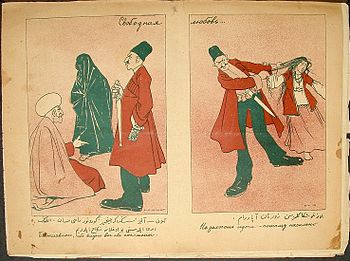 |
| Criticism about the Azeri society tradition from domestic violence to the social and political participation of women in community (Photo credit: Wikipedia) |
In the common scenario, a woman is raised from birth to believe that she must get married as early in life as possible. The importance of following her father's orders is emphasized, and the whole thing is wrapped up in fundamentalist religious dogma. According to the norms of the community, this is how marriage is supposed to work. Those who question it risk expulsion and shunning, even by their own families. When the marriage rolls around, she feels that she cannot say no. This raises the fascinating question of to what degree some of these marriages can really be said to be consensual. And if they aren't consensual, how can they be legal?
At one point, I found myself thinking that it is too bad this isn't the sort of thing more modern feminists in the U.S. were focusing on (instead of manspreading, for instance). It seems like many of these women, some being forced into marriage as young as 12 (which is apparently somehow legal in some states), could use the support. But then I realized that this was stupid on my part for at least two reasons. First, the obsession with manspreading which plagues some modern feminists (and I) does not mean that they aren't also working on this or other issues. People can pursue more than one goal with their time and effort. Second, anyone can help and not just feminists. It isn't fair to make it their responsibility or single them out for not doing more. I can help too, feminist or not.
As I noted above, this is a topic I don't know much about. I don't believe it has ever really been on my radar at all. I'd like to learn more about it and about what I might be able to do to help. In the meantime, I certainly plan to do more careful listening when I run across women who are religious fundamentalists and report being unhappy in their marriages. Helping them see that there can be a way out of these religious communities, as well as their marriages, seems like it could be valuable.
This whole thing strikes me as yet another example of the sort of harm fundamentalist religion can do, particularly when young children are subjected to religious indoctrination, overly rigid community norms, and an willingness to punish dissent in order to maintain harmful traditions. I've certainly thought about the issue of consent in the context of genital mutilation, reproductive rights, and end-of-life decisions; I'm now thinking of it in the context of marriage too.